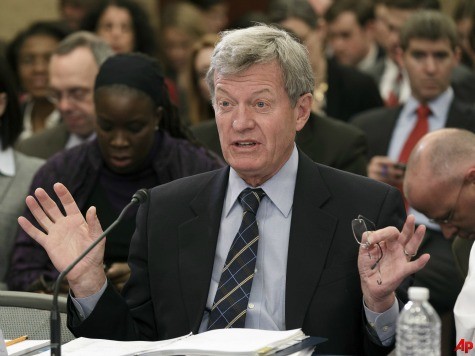
Senate Majority Leader Harry Reid has vowed to push his caucus’ budget plan through the Senate before the Easter recess. The plan raises taxes by over $1 Trillion and increases net spending. It doesn’t achieve balance and adds trillions to the national debt. To pass his budget, Reid will need the votes of a handful of Democrats up for reelection next year in red states. This could be a defining vote of the midterms.
The Senate voted on a series of GOP amendments to the budget throughout the night on Thursday. A similar “vote-a-rama” will occur today, with a likely final vote on the budget late Friday or Saturday. So far, Reid has held his caucus on almost every amendment vote. Sen. Joe Manchin voted with the GOP on one amendment. As the final vote nears, the pressure on red state Democrats will intensify.
Next year, Democrats have to defend seats in very conservative states. They have vulnerable members in North Carolina, Louisiana, Montana, Arkansas, Alaska and South Dakota. They also have to defend seats in competitive swing states, but a vote for the Senate budget plan is most vulnerable in the red states.
Sen Dems faced similar political calculus in 2010 and 2012 and was a driving reason Reid didn’t offer a budget for four years. As public anxiety about the deficits has increased, he no longer has that option.
Sen. Tim Johnson from South Dakota is widely expected to retire, rather than run for reelection, freeing him to vote for the budget. Sen. Landrieu from Louisiana has already announced that she will support the budget.
Reid can afford five defections on the final budget, relying on VP Joe Biden’s tie-breaking vote. If the other four red state Dems vote against the budget, Reid will still have enough votes to pass his budget. Sens. Joe Donnelly (IN) and Heidi Heitkamp (ND) have expressed reservations about the budget. They just won election to the Senate, however, giving them five years to “make up” a bad vote. If they vote for the budget, they would allow the other red state Dems to vote against it.
If any of the red state Dems vote for the budget, however, they will be in a more difficult position for reelection. The Senate budget plan is the polar opposite of voter sentiment today. It both raises taxes and increases spending. Worse, it fails to tackle entitlements in any real way, putting the budget on deficit auto-pilot far into the future.
If a long-term budget deal is brokered later this year, the coming vote on the Senate budget plan will fade away. If a deal isn’t reached, however, this vote will stand as each Senator’s official position on our fiscal challenges. For the red state Dems, it will be a defining vote.
Reid will likely get his budget, but it may cost him his majority.

COMMENTS
Please let us know if you're having issues with commenting.